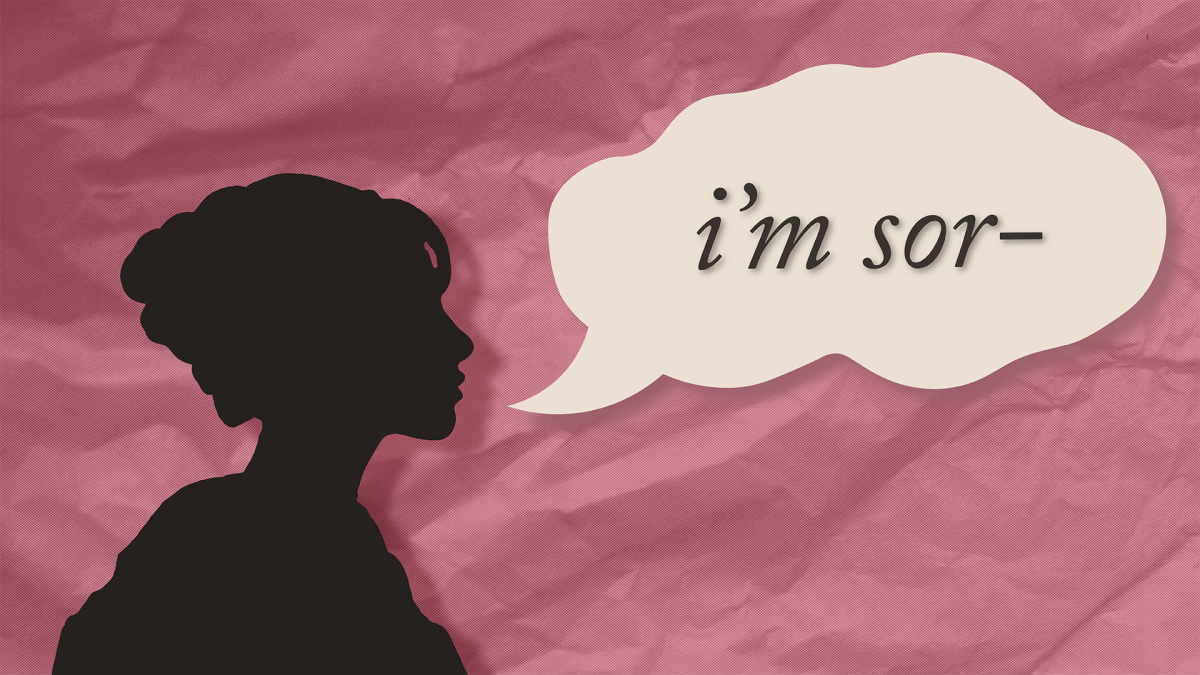Women should apologize less. That’s it.
As a disclaimer, I’m not saying women should never apologize for anything at all, or that we should go around purposefully committing apology-worthy acts for the sake of not apologizing for them. I’m saying that women have long been subject to the stereotype that we apologize more than men, that we apologize too much.
As it turns out, we do. But the reasoning behind our unnecessary apologies isn’t as obvious as you may think.
It’s not that women simply apologize more, full-stop. Social scientific studies show we have different thresholds for what warrants an apology. Essentially, we think more things deserve apologies than men do.
“Apologies themselves are often considered acts of politeness, as they theoretically help both the apologizer and the apology recipient save face following an injustice,” Karina Schumann wrote in her study. “It is thus not surprising that women, who are stereotypically considered to be more polite and relationally concerned than men, are also commonly believed to be more apologetic.”
Personally, I have a terrible tendency to use “sorry” as a filler word of sorts. Most of the time, I couldn’t tell you exactly why I’m saying it. I do, however, know that I was taught to be polite and, while I don’t consider myself particularly rude, I can find it difficult to be overly-friendly — a common struggle for women.
I find my dry demeanor might sometimes be misconstrued as rudeness, or at least feels like it may. One way I compensate for this trait is to apologize excessively, whether or not I sincerely owe an apology. Apologizing for this reason has become second nature to me and many other women.
But it doesn’t end there. There are a slew of other reasons a woman might apologize unnecessarily. Throughout our patriarchal history, women have been forced to be quiet, obedient and convenient, and some of that mindset still lingers in our culture today, factoring into our beliefs about what deserves an apology.
Social conditions have drastically improved for American women, but the idea that we should occupy as little space as possible is so ingrained in society that we often forget that we are allowed to unapologetically exist and make mistakes.
Other times, we simply want to be liked — because an unlikeable woman is a bad woman — and apologizing can increase trust.
It’s important to remember that too much of anything is never a good thing.
On the other hand, women who expect apologies from others are victims of equal criticism. Instead of unnecessarily defaulting to an apology, Chappell Roan, a popstar only recently rising to public prominence, has been a subject of controversy for calling out mistreatment from photographers. At a film premier, Roan said to one photographer, “You were so disrespectful to me at the Grammys. … I remember. You were so rude to me. And I deserve an apology for that.”
Our threshold for what warrants an apology often results in us apologizing more, so it’s interesting to see a woman use it instead to gauge when she deserves an apology, and rightfully so. It’s healthier that way too.
Over-apologizing can lead to lower self-esteem and projects a lack of confidence. If you convince yourself that you must apologize for everything, you — and others around you — will start to think that you really can’t do anything right.
On the bright side, this habit can be broken like any other. As an alternative to apologizing, you can always thank someone for giving you an ounce of grace in a situation, one that probably isn’t even as bad as you think it is to begin with.
While this advice can be heeded by anyone, it’s especially important for women to try and reframe their mindsets since we’re the ones likely to feel like we should. Too many apologies fuels an unconfident perception and turns the genuine ones meaningless, so it’s best to save them for when they’re needed.














